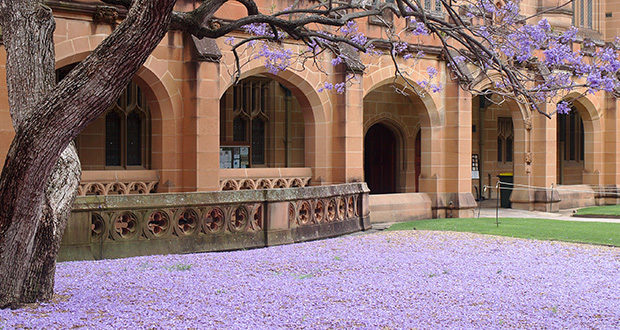The succession of restriction-easing announcements from our most affected states, and the case-free landscape in others, adds to the sense that this might be the end of lockdowns. Talk in universities is of fuller returns to campus, and returning international students.
While most staff may be preoccupied with getting to exams and year’s end with a wet sail, leaders and CFOs in particular are looking ahead and breathing a sigh of relief, one suspects. But if this is the end, what is its legacy? It feels like a time for Australia to reconnect with the world. A world that has opened up, before us, and is significantly more interconnected than we are with it. We better get a move on. This one probably is a race.
One competition that we have won is to host the Olympic and Paralympic Games of 2032. They are Australia’s third Olympics, and first for Queensland. Eleven years may seem a long way away, when we have lived with daily turbulence from press conferences, and all staff emails and town hall meetings. But some principles of great project management are to plan early, maximise opportunities and benefits, and anticipate the legacy that a project will leave.
There is a new focus in the delivery of major events in seeing related projects as interventions into existing infrastructure, and using and adapting existing infrastructure to achieve sustainability targets. The sort of infrastructure and other projects that an Olympics generate include sporting venues, media, accommodation, transportation, logistics, security and water. The opening of an Olympic Games gives an inflexible end-date for delivering a complex program of sustainable infrastructure projects. For the Sydney 2000 Olympics, researchers studied how to achieve this: the project teams have to both look forward to their ends and visualise the means to achieve them. This can itself feel like a race.
Yet we have learnt from other recent Olympic games that where the focus on ends is narrowly defined, then the investment in these projects can fail to provide wider and longer-term benefits to the host city. An alternative approach is suggested by the London 2012 Games, which were seen as a means to regenerate East London. Here, the delivery project teams had a strong focus on legacy, despite uncertainty regarding the eventual ownership and uses of venues. This added to the challenge of designing both for Games and for legacy uses, and the handover of infrastructure and its associated information. As in a relay race, a baton is passed from the delivery teams, to the Games operator, to the eventual owners and operators. And can also be passed from one games to the next.
The 2032 Olympics provide an opportunity to showcase Australia, and its universities, to the world. There is a need for new forms of project leadership, and the opportunities that hosting the Olympic Games offers for Brisbane are to work with local communities, to gain profile on the international stage and to demonstrate what innovative hosting can look like in a new post-COVID world. Our Australian universities can engage through leveraging their expertise on net-zero, project leadership, and resilience in infrastructure. Olympic organising committees would be well advised to engage with Australian universities – to embed researchers into projects, to take advice from leading experts, and to capture lessons learnt as part of the legacy – in order to take advantage of world-class project expertise. There is a need for strategic conversations between industry, government, research and policy on how projects are conceived, set-up, delivered and add value. They can draw on world-class expertise with experience from around the world.
But the opportunities for universities to engage with the games extend far beyond infrastructure and project management. Griffith University’s experience as a tier one partner of the Gold Coast Commonwealth Games of 2018 was the first time globally any university had such a deep engagement with a major event of this scale. A commitment was honoured to the organising committee to provide 500 credit-gaining work-integrated learning internship students from a single new program covering 60 courses over all faculties to their temporary workforce. It was doubled with a further 500 students using the same new learning mechanism with other games partners and suppliers.
The experiences were unprecedented for 1000 students then and resulted from leadership and facilitated collaborative planning. The opportunities for many times more student interns, across multiple universities in 2032, can’t be left to chance. An example in 2018 were the 40 journalism students who ran a press office for a week co-located with the games' village. They produced a daily newspaper for all athletes and officials, with unprecedented access. Try replicating that in a classroom or other learning setting.
Students and staff contributed to medal design, baton relay manufacture, ventilation installations in velodromes, stadium architectural design, digital marketing strategies, HR planning, water quality management, opening and closing ceremony performances and to the first reconciliation action plan ever adopted by any major games.
But it is the sustainable partnership and engagement legacy that can arise from involvement in a major event such as this that is the enduring opportunity for all universities. If a university, or groups of them, simply prepare and rock up for two to three weeks and then return to previous practices for learning, research, partnerships and engagement, a huge opportunity will be lost. A major event, such as the Brisbane Olympics, gives an opportunity for many Australian universities to demonstrate their value on a world stage, when everyone is watching, in ways that change how all universities are perceived, valued and engaged with, sustainably.
Imagine what could be possible if universities started planning early for this together, rather than treating it as a competition and a race? There is a sense that we are coming out into the light at the end of the tunnel, into a new arena of partnerships and collaboration. The planning that starts now for the Brisbane Olympic games gives a real chance to build an Australian team that can go for gold. It is probably what the organising committee, nation and world expects. It is what we both advocate for, and was a strong focus in the HEDx episode that we published last week. You can hear us share and reflect on our respective games' experiences working in universities, drawn from around the world, by listening here.
Martin Betts, Emeritus Professor and Co-founder of HEDx
Jennifer Whyte, Professor of Project Management, Head of School of Project Management and Director of the John Grill Institute for Project Leadership, University of Sydney
Do you have an idea for a story?Email [email protected]
 Campus Review The latest in higher education news
Campus Review The latest in higher education news



